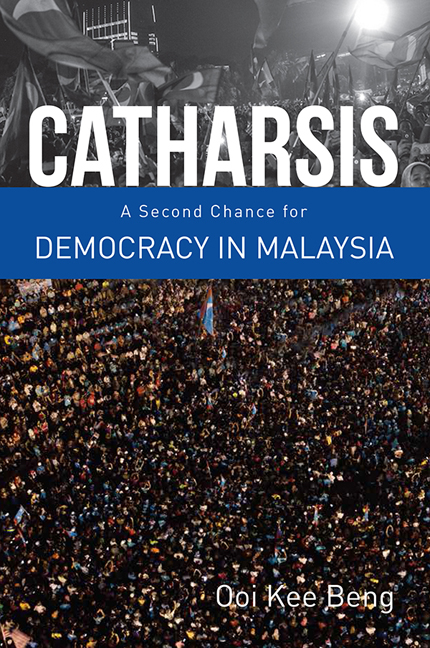Book contents
- Frontmatter
- Contents
- Foreword
- 1 Introduction – Malaysia's Future Is Redeemed
- Before Pakatan Harapan
- 2 After All These Years, Malaysia Is Still Held Hostage
- 3 Beyond the Nationalism Trap
- 4 Federating Malaysia — A Continuous and Troubled Process
- 5 Funeral for a True Son of Penang
- 6 Let's Work Out What Malaysia Is Good For
- 7 The Unity Fetish
- 8 When the National Narrative Loses the Script
- 9 Let's Be Cosmopolitan and Leave Multi-ethnicity Behind
- 10 Noses Don't Grow Back
- 11 Mahathir's Bersatu is Best Understood as an NGO
- Before 9 May 2018
- With Mahathir at the Helm
- Beyond 9 May 2018
- About the Author
8 - When the National Narrative Loses the Script
from Before Pakatan Harapan
Published online by Cambridge University Press: 12 February 2019
- Frontmatter
- Contents
- Foreword
- 1 Introduction – Malaysia's Future Is Redeemed
- Before Pakatan Harapan
- 2 After All These Years, Malaysia Is Still Held Hostage
- 3 Beyond the Nationalism Trap
- 4 Federating Malaysia — A Continuous and Troubled Process
- 5 Funeral for a True Son of Penang
- 6 Let's Work Out What Malaysia Is Good For
- 7 The Unity Fetish
- 8 When the National Narrative Loses the Script
- 9 Let's Be Cosmopolitan and Leave Multi-ethnicity Behind
- 10 Noses Don't Grow Back
- 11 Mahathir's Bersatu is Best Understood as an NGO
- Before 9 May 2018
- With Mahathir at the Helm
- Beyond 9 May 2018
- About the Author
Summary
Malaysia is in serious trouble today because the different narratives that have been driving politics in the country for more than half a century have come into direct conflict with each other. This shows more clearly than ever that what was always important for social peace in the country was a balance between contradictory narratives.
While a narrative is simply an account that connects chosen events and experiences in a story-like fashion, one that seeks to describe a nation is something quite different because it subscribes roles and identities to individuals and groups. It is also one that has to stimulate pride and participation in its citizens and provides a clear sense of historical place for the nation as a whole.
Essentially, a good national story is one that is inclusive of as many of the inhabitants as possible since the country requires sufficient harmony for the economy to function.
But there are abundant cases where minorities are kept outside the mainstream, or a given secondary or peripheral identities. As extreme examples, we have the apartheid regime in South Africa which suppressed the numerical majority (but economic minority) and the Nazis in Hitler's Germany of course, which had ‘final solutions’ for ‘inferior and harmful minorities’ at the lower end of its ethnic hierarchy.
It is true that the national storyline is seldom dictated by a single powerful regime. Instead, what we have are endless negotiations and contestations between different national scripts. In modern times, with citizens enjoying broad exposure to the world, high educational levels and free information flows, this seems quite inescapable.
That is why democracy in some form seems such a necessary thing. It allows for different scripts to vie with each other by non-violent means. Otherwise, the contentions tend to take an all-or-nothing form. That way lies chaos, civil war and economic stagnation.
Where Malaysia is concerned, what does the history of this balancing of narratives look like?
On 16 September 1963, the Federation of Malaysia was born through agreements between the Federation of Malaya, the recently self-ruling British crown colony of Singapore and the British territories of Sabah and Sarawak. And on 9 August 1965, Singapore separated from the federation.
- Type
- Chapter
- Information
- CatharsisA Second Chance for Democracy in Malaysia, pp. 28 - 31Publisher: ISEAS–Yusof Ishak InstitutePrint publication year: 2018

